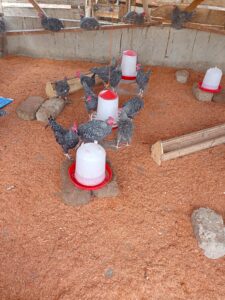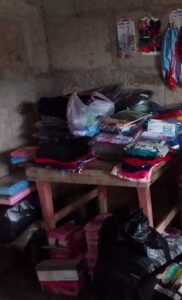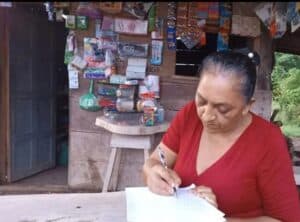Fighting Back Against Fall Armyworm, Part II

Maize
Maize is the most important staple cereal crop grown by smallholders in sub-Saraharn Africa. Maize accounts for more than half of all cereal production in Ghana, and one-fifth of the calories and protein consumed in West Africa (cabi, 2017). Yet fall armyworm has decimated the maize crop in Ghana since its arrival in November 2016, accounting for 45% of maize crop loss in the country last year (CABI). Since smallholder farmers grow the vast majority of maize in the country, they’re the ones most affected by this attack. Ghana was among the first countries in Africa invaded by fall armyworm, which has now spread across all of sub-Saharan Africa.

Armyworm attack on a maize plant
Since the fall armyworm is new to the continent, it was unknown what methods and/or inputs would best control the pests. The attack has been a major problem and affects nearly all maize farms in Ghana, discouraging farmers and reducing their interest in maize cultivation. Some farmers, such as the Adankwame Farmers Association, opted to cultivate rice instead of maize in the major growing season (April – September) due to the forecasted challenges fall armyworm would pose to maize yields. Yet cultivating rice instead of maize wasn’t a viable option for all farmers.

An armyworm
At the Training Center, we opted to plant maize in spite of the threat of fall armyworm to test out ways to address the pest and better advise the farmers and schools who opted to cultivate quality protein maize (QPM) this year to contribute to the school feeding programs and their own household consumption. We worked closely with the Ministry of Food and Agriculture (MOFA) Ashanti Regional Crops Officer to assess the cost, availability, and efficacy of inputs, to communicate the options to maize farmers, and to help them access the best inputs and ensure they were able to access authentic applications as fake products began to come onto the market.
We shared the results with farmers dealing with similar situations by organizing Farmer’s Field Schools in the communities and hosting practical training sessions on demonstration farms in the communities we serve. We invited farmers to the Field Schools, which are normally on taboo days – days when they don’t go out to the farm anyway – and taught farmers improved farming methods, including how to address pressing challenges such as the fall armyworms attack. Some of the farmers who attend the field schools also become trainers and train fellow farmers who were not able to attend the training.
Advising Individual Farmers
Madam Gifty was one of the farmers who came to the Center seeking advice. Gifty lives at Nkwakrom, same community as the training center, and she occasionally comes to provide services such as manual weeding and harvesting of vegetables. Through that work, she witnessed first-hand how the Center used a combination of different chemicals to fight fall armyworm and by implementing the same practices on her own farm, was able to survive the attack of fall armyworm and secure a laudable maize harvest.

Gifty’s maize survives fall armyworm attack
Supporting School Farms
A key concern regarding the fall armyworm attack was ensuring each school in our school feeding program had an adequate supply of QPM for the semester. Thankfully, Ama Badu D/A school did an excellent job of cultivating the maize and escaped the fall armyworm attack. The school has adequate maize which they are currently sun drying. Once sufficiently dried, it will be stored in PICS bags to prevent post-harvest loss due to pests.

Dominic controlling armyworms with Lamder and Golan mixture
Unfortunately, most schools were not able to escape the attacks. Bedabour Islamic school farm, cultivated by the PTA, suffered armyworm attack but treated it timely and is doing well. It was observed during our visits to the school farm that the treatment was initially applied at inconsistent frequencies, and therefore they were advised to spray the crops at weekly intervals so long as the insects appear on the plants to achieve optimal results.
The QPM farms for the two schools in Beposo likewise suffered from a fall armyworm attack, so Self-Help provided Diazol insecticide, which at the time was MOFA’s recommended treatment, to treat armyworm infestations for two weeks after planting. The Diazol proved unsuccessful in that case, so we provided Attack insecticide instead, which helped. (Note: the latest testing shows that Bypel is the most recommended chemical for treating the worms, although accessing the actual treatment as opposed to an inferior knockoff or lookalike remains a challenge for farmers.)
In Fankamawe, the PTA planted the farm and armyworm destroyed everything. Under the chief’s leadership, the community is planning to plant again in the dry season. Following the destruction, by the worms, the school has relied solely on donations for their maize supply, a situation which is not sustainable, but which is helping prevent child malnutrition in the short term.
When infestations like these occur, your ongoing support is the reason we’re able to get the needed education and inputs out to farmers so swiftly to help them avoid or manage pest infestations, and ensure an adequate food supply for their families. We are so grateful!




